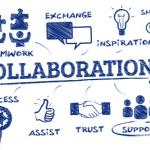Defining what Financial planning and analysis (FP&A) does has always been challenging. Most people place FP&A...
 Collaboration is important, as “goes without saying”: “We must collaborate to solve this problem” or “They don’t collaborate!”, about an unsuccessful team. On one hand it is obvious what collaboration means – working together, duh! However, I came across a phrase which defines collaboration clearly and to the point.
Collaboration is important, as “goes without saying”: “We must collaborate to solve this problem” or “They don’t collaborate!”, about an unsuccessful team. On one hand it is obvious what collaboration means – working together, duh! However, I came across a phrase which defines collaboration clearly and to the point.
Thank you to Mike Hohnen for using the quote in his article. The quote originates from “A bigger prize: How we can do better than the competition (2014)”, by M. Heffernan:
Collaboration is a habit of mind, solidified by routine and predicated on openness, generosity, rigour and patience. It requires precise and fearless communication, without status, awe or intimidation. It is hard because it allows no passengers.
Heffernan's description has three parts and starting from the end:
It (collaboration) is hard because it allows no passengers.
This is a fine way of saying that collaboration requires active participation by all members at all times. We all know of colleagues coasting extensively and failing to contribute to the team efforts and that is not ok – no stowaways allowed!
So – when part of a team, in any form, involve yourself, and do not let the others do the work. Be active, contribute and commit.
It (collaboration) requires precise and fearless communication, without status, awe or intimidation.
Unclear and vague communication leads to confusion and uncertainty. Collaboration requires that team members feel certain about each other’s views and standpoints and this require precise communication and clarifying dialogue. When team members are not comfortable of own expressions, the communication becomes vague and guarded and imprecise. This is counterproductive, and it must be safe to express views, also the unpopular view.
Collaboration is a habit of mind, solidified by routine and predicated on openness, generosity, rigour and patience.
Collaboration is culture, and it must be an integral part of the organisation’s culture. Culture creation happens through continuously promoting the desired behaviours until becoming ‘routine’; “the way we do things around here”. To strengthen cooperation, we must be open in expressing views, but more importantly in our willingness and openness to listen and respect the views of others. We must generously encourage others to express themselves and be patient in listening. However, we must be committed ourselves and demand efforts, commitment and participation from others and ourselves.
What does this mean for all team members and for leaders?
- Respect all members and opinions, irrespective of organisational level and apparent abilities; be humble, listen first and seek to understand.
- Do not shy away from conflict, but use it constructively and encourage conflicting views, especially those opposed to your own.
- Immerse in the cooperation, do not let others do all the work and do not allow slackers, all must participate, it is bad for morale if not.
- Work actively to create meaning and relevance. Nobody participates and commits to futile undertakings.
- Be committed and demonstrate your commitment; an uncommitted and vague leader creates no followers.
What signs do you notice in your organisation’s culture on collaboration – does your culture foster collaboration or are there traits that hampers collaboration?
Does your leader encourage and foster a commitment to good collaboration?
What about yourself? What do you do to improve collaboration?
Subscribe to
FP&A Trends Digest

We will regularly update you on the latest trends and developments in FP&A. Take the opportunity to have articles written by finance thought leaders delivered directly to your inbox; watch compelling webinars; connect with like-minded professionals; and become a part of our global community.



